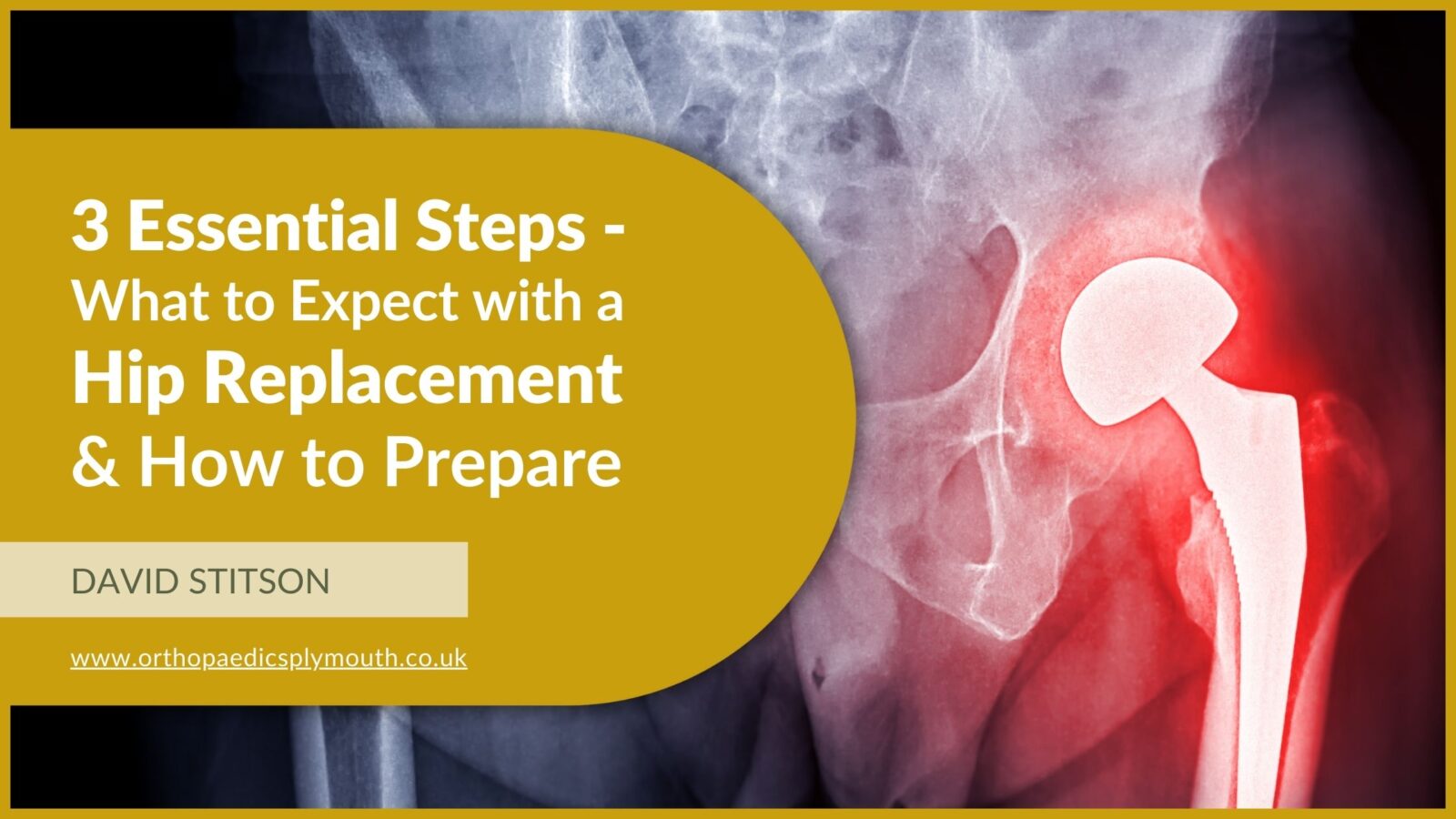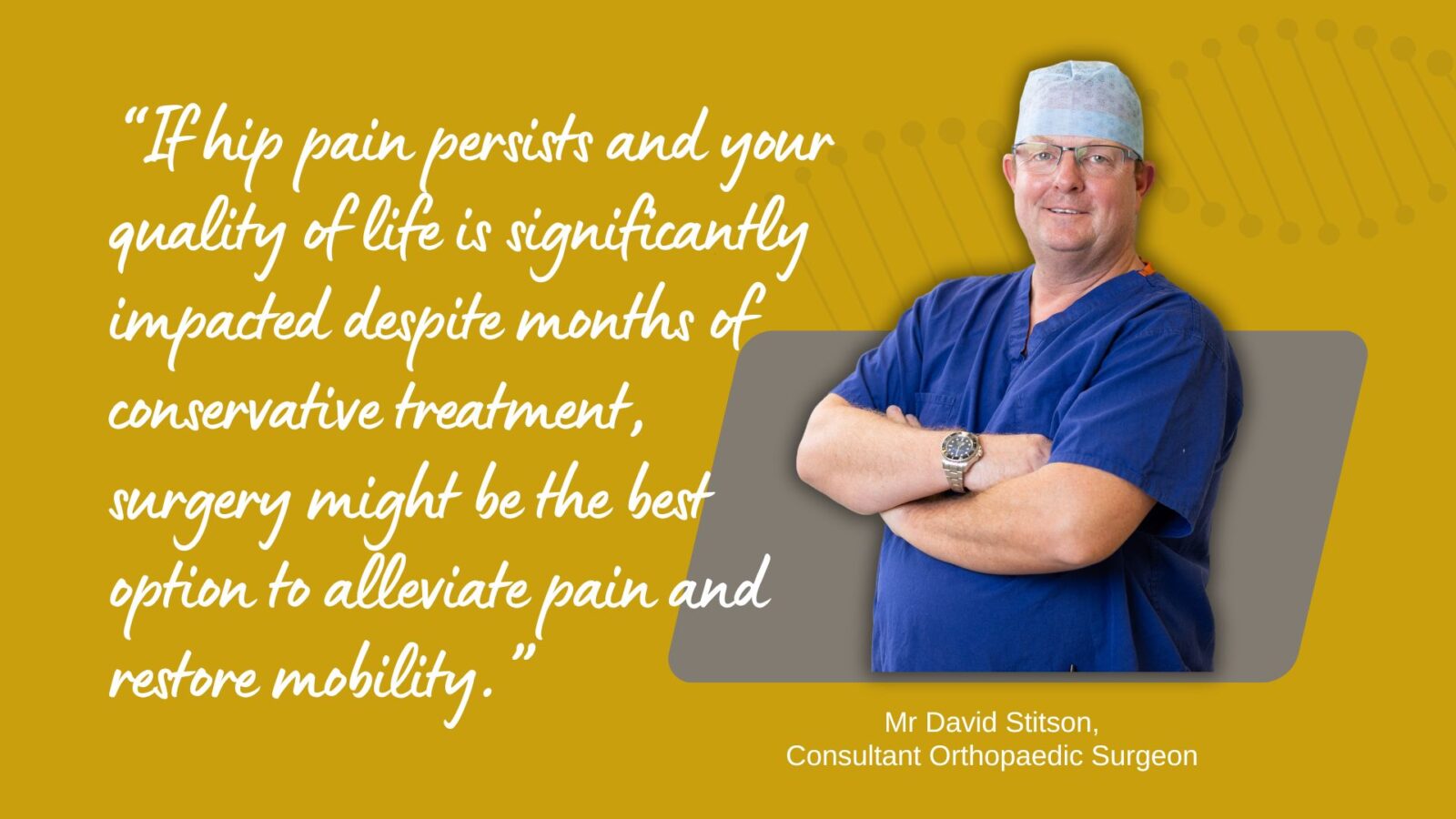What to Expect with Hip Replacement Surgery
1. Understanding the Surgery:
- Procedure: Hip replacement surgery involves replacing a damaged hip joint with an artificial one, typically made of a combination of metal, ceramic, or plastic. Components may be secured with bone cement of uncemented. The surgery is common for people with severe arthritis or hip injuries.
- Duration: The surgery typically lasts 1-2 hours.
- Types: There are two main types: Total Hip Replacement (replacing both the ball and socket) and Hip Hemiarthroplasty (replacing only the ball of the joint – generally only used to treat hip fractures).
2. Hospital Stay and Recovery:
- Hospital Stay: Most patients stay in the hospital for 1-3 days post-surgery, depending on their recovery. Day-case hip replacement may also be available for suitable cases.
- Pain Management: Post-operative pain is managed with medications. Some discomfort is normal but it decreases over time.
- Mobility: Patients are encouraged to start moving soon after surgery. A physiotherapist will guide you through exercises to regain strength and mobility.
- Rehabilitation: Full recovery can take 3-6 months, depending on your overall health and adherence to rehabilitation protocols.
3. Potential Risks:
- Infection: There’s a small risk of infection at the surgical site (approx 1%).
- Blood Clots: Patients are given blood thinners to reduce the risk of DVT or Pulmonary Embolus.
- Dislocation: Although rare, there is a risk that the new hip joint could dislocate (approx. 1-2%).
- Leg Length Difference: Some patients notice a slight difference in leg length after surgery.
- Vessel and Nerve injury: Occasionally
- Fracture: Can occasionally occur during a hip replacement procedure
- Bleeding: Can occasionally occur during a hip replacement procedure
- Death – Although rare, the risk of dying in the first 90 days after hip replacement does increase depending on a patient’s age and concurrent medical conditions.
How to Prepare for Hip Replacement Surgery
Pre-Surgery Health Optimisation:
- Medical Evaluation: To ensure your overall health is optimal patients will undergo a thorough pre-op medical assessment.
- Medication Management: Discuss any medications you are taking with Mr Stitson, as some may need to be paused before surgery.
- Physical Preparation: Engage in preoperative exercises to strengthen muscles around the hip. This can aid in your post-operative recovery.
Home Preparation:
- Create a Safe Environment: Remove trip hazards, perhaps arrange for a sleeping area on the ground floor if you live in a multi-story home and consider assistive devices like handrails in the bathroom. (Advice will be provided as part of the pre-op process)
- Meal Prep: Prepare and freeze meals in advance to reduce the need for cooking during recovery.
- Arrange for Help: Ensure you have someone to assist you with daily tasks during the first few weeks post-surgery.
Mental and Emotional Preparation:
- Set Realistic Expectations: Understand that recovery is gradual. Set small goals and celebrate progress.
- Educate Yourself: Learn about the procedure, recovery process and rehabilitation exercises
- Support System: Lean on friends, family or a support group for emotional support during your recovery.
Day of Surgery:
- Fasting: You will likely be instructed to avoid eating or drinking for 6 hours before the surgery.
- Comfortable Clothing: Wear loose, comfortable clothing to the hospital.
- Personal Items: Bring necessary items like ID, insurance information and any personal care items you might need during your stay.
It is essential to discuss all your options with Mr Stitson, who can guide you through the treatment process and advise on how you can achieve the best possible outcome.
Post-Surgery Tips
Follow Post-Op Instructions:
- Wound Care: Keep the surgical site clean and dry and follow Mr Stitson’s instructions for dressing changes.
- Medication Adherence: Take prescribed medications, including pain relievers and blood thinners as directed.
- Exercise and Physiotherapy: Stick to your physio regimen to strengthen your hip and improve flexibility.
Lifestyle Adjustments:
- Weight Management: Maintaining a healthy weight can reduce stress on the new joint.
- Low-Impact Activities: Engage in activities like walking, swimming or cycling instead of high-impact sports.
- Balanced Diet: A nutritious diet rich in calcium and vitamin D supports bone health.
Long-Term Care:
- Regular Check-Ups: Schedule regular follow-up visits with your surgeon (as advised) to monitor your new hip replacement. Patients are typically seen at 6-weeks and 12-months post-op (more often if required or advised).
Contents
ToggleWatch for Signs of Complications: Report any unusual pain, swelling, or redness around the surgical site to your doctor or Mr Stitson.
Hip replacement surgery is a major procedure with a significant recovery period, but with proper preparation and adherence to post-op care, most patients experience a significant improvement in their quality of life. Planning ahead and understanding what to expect helps to ensure a smooth recovery process.
About Hip Surgery
Hip replacement surgery replaces the worn-out, painful and stiff hip joint with a new prosthetic joint. This procedure is normally performed under spinal anaesthesia and is commonly followed by a night or two in the hospital. Day-case hip replacement surgery may be an appropriate option for you.

About Mr Stitson
David Stitson is a Plymouth-based Consultant Trauma and Orthopaedic Surgeon. Trained both in the UK and internationally, he has worked in medicine for more than 20 years for the NHS, for the Royal Air Force and in private practice. Mr Stitson operates privately at the Nuffield Health Hospital, Plymouth.

The Nuffield Plymouth CQC Rating
The Nuffield Hospital has a history that spans over half a century and has built a reputation for high standards of care, professionalism and expertise in delivering health services. They aim for continuous quality improvement in everything they do.
Active Quality and Governance programmes are in place at the Nuffield Hospital Plymouth. As part of this, the hospital is inspected by independent healthcare regulators to ensure it meets the fundamental standards of quality and safety as determined by the regulating body (CQC).
In the most recent inspection, Plymouth Nuffield Hospital was rated as ‘Good’ overall, however, the surgical element of the inspection was rated as ‘Outstanding’. The hospital was referred to as:
“Outstanding in effective and caring, and
Good in safe, responsive and well-led.”





